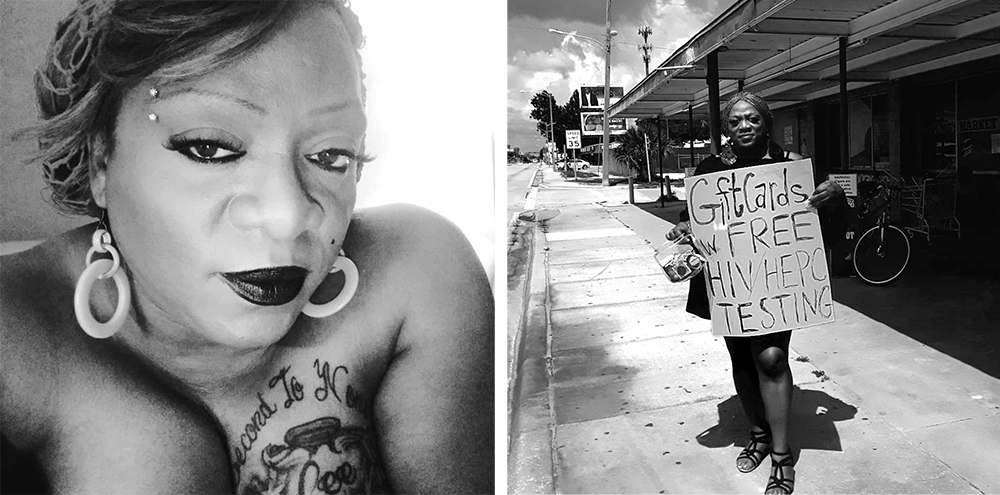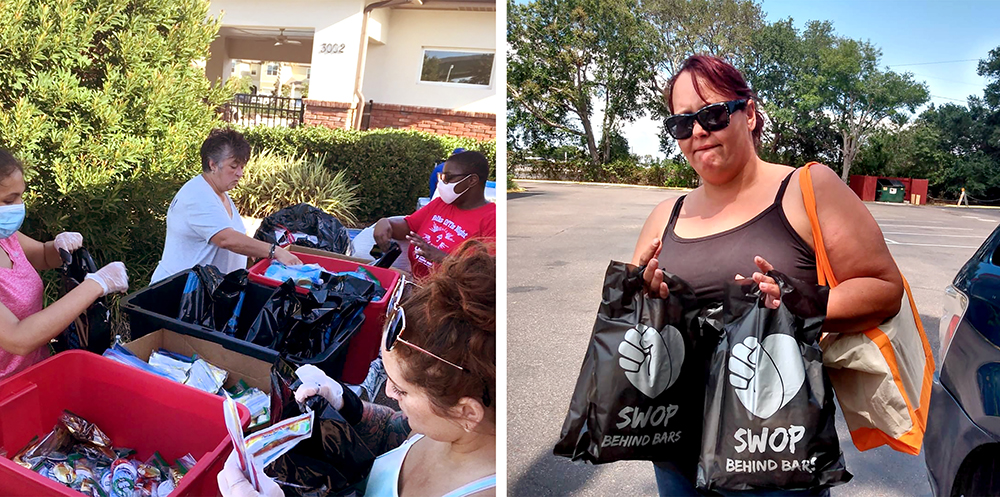NextGenRadio
Florida Newsroom
Finding, coaching and training public media’s next generation.
“In the Time of COVID-19”
Illustrated by Ard Su
“Consider me an essential worker.” How one woman supports Black trans sex workers in the Tampa Bay area.
The COVID-19 pandemic has made street-based sex workers even more vulnerable. Ashunte Coleman, a Black trans woman, provides health services, resources, and a safe space for her community.
“I learned that those things that were taught to me in prison with the prison release program— that you can go out and you can go and apply for jobs and you must be honest and they will employ you was a lie— it was all a f—–g lie,” said Ashunte Coleman, a former sex worker. “For one, I couldn’t find a job. I was already homeless, and I was staying with a lady that was drug dependent.”
For Coleman, finding job opportunities after being incarcerated led to many dead ends— a situation only intensified by her identity as a Black trans woman.
“Consider me an essential worker.” How one woman supports Black trans sex workers in the Tampa Bay area.

Ashunte Coleman poses for a photo in January 2020 (left). Coleman works with Sex Worker Outreach Project (SWOP Tampa) on September 16, 2019 to provide free HIV and Hepatitis testing (right). Free testing is just one of the health services that SWOP and LIPS work together on to provide for the community. (Photos provided by Ashunte Coleman)
“A lot of us are not allowed to age as children and go through…school as trans women,” Coleman said, emphasizing that being trans in a Black religious family is taboo. “So a lot of transgender women end up on the streets, and in the South, you only have one thing to offer and that’s sex work.”
After moving from Atlanta last year, Coleman was shocked to find there weren’t any programs in Tampa to support the trans community. Coleman took it upon herself to fill this void by creating Ladies Intervention Project For Success (LIPS) to promote health and wellness for her sisters in the area. Unlike its parent organization, Sex Workers Outreach Project (SWOP) Tampa, a branch of a national network of sex workers, LIPS focuses specifically on issues that people who identify as transgender may face. It offers the women testing for HIV and hepatitis C, as well as hygiene kits, which include things like soap, toothpaste, deodorant, condoms and lubricant.
“I pay my husband to make sandwiches to go in the (kits),” said Coleman. “I mean, it’s a family thing. But yeah, it’s just to give them some little bit of love in the struggle.”
Since the coronavirus pandemic started, they’ve added face masks, hand sanitizer and wet wipes to the hygiene kits.
Women who work in the sex industry still need to make a living during the pandemic. Street-based workers have found that COVID-19 hasn’t changed much about their industry, leaving many vulnerable to the spread of the virus.
“I can only tell you from the escort’s point of view, as a Black trans woman and a street-based sex worker, the streets are still flooded with johns trying to pick up the girls,” Coleman said. “It has not changed. Guys are still trying to do what they do, you know men are selfish. They don’t care.”
“And when you are on the streets and when you try to survive basically on the streets, you don’t get a chance to screen who you get in a car with,” she said. “Your survival depends on you getting inside of a car. So those girls are still out there, and they still need that assistance. And because of the pandemic, it never stops. You can consider me an essential worker.”
The state of Florida criminalizes sex work and defines the industry as people who are not married to each other who buy, sell, or solicit sexual favors for money. The criminizilation of sex work especially targets Black trans sex workers because of their gender, identity, and race. Trans rights activists and sex worker rights activists believe that the decriminalization of sex work would alleviate the violence that trans women face within the industry, as well as in the justice system.
“So organizing is kind of difficult when you’re organizing a group of people that come with trauma and neglect and abuse, and they don’t trust,” said Coleman. “They’re not willing to trust as easily, you know, because we’ve already been ostracized, we’ve been taken for granted. And like I said before, a lot of these girls are comfortable with doing what they’re doing. Why change it?”
As a part of her work with LIPS, Coleman hosts weekly meetings called My Sister’s Corner in her home, where the small group holds discussions revolving around trans-led issues. They talk about everything from building life skills outside of the trade to their own personal lives.
“One girl’s mom had passed. So we centered everything around healing,” said Coleman. And that’s what the group is basically for. It’s about healing and creating a sisterhood that we don’t have.”
She feels that it’s important to continue to meet in person because of the healing work that happens within My Sister’s Corner. Due to her background as a certified nursing assistant, she is well aware of the risk of letting others into her home. However, because these meetings promote love, understanding, and compassion between the girls who attend, she will continue to host meetings in her home. Her goal is to make sure they know that not only is she there for them, but also so is a whole community of other women and sex workers.
She expresses her love for the members of My Sister’s Corner by cooking every Wednesday for the weekly meetings. The women are greeted by home-cooked meals like pork roast with black beans and rice, chicken alfredo, or fried cabbage with sausage, which Coleman attributes to her southern roots in Mississippi.
Despite the challenges, Coleman remains optimistic about the future of LIPS.
“My goal is to get enough funding for a building so that I can have a drop-in center, so that I can have a place for the girls to stay, so that I can create programs that are sustainable educational programs…life skill coaches and things like that.”
Coleman hopes to continue to collaborate with LIPS’ parent organization SWOP Tampa. She feels it’s important to provide these resources to other women because she didn’t have them herself while transitioning out of Florida prisons. She wants to be there for this community of women to make sure they know life is waiting for them outside of the prison system.
“I want to be able to have that structure set up for them,” Coleman said. “That’s what I want and I’m not going to stop until I get that.”

SWOP volunteers prepare hygiene kits with items like soap, razors, toothbrushes and toothpaste for street-based sex workers in the Tampa Bay area during the summer of 2020. (Photos courtesy of Ashunte Coleman)
About NextGenRadio
The Next Generation Radio Project is a week-long digital journalism training project designed to give competitively selected participants, who are interested in radio and journalism, the skills and opportunity to report and produce their own multimedia story. Those chosen for the project are paired with a professional journalist who serves as their mentor.
This edition of the #NPRNextGenRadio project was produced in collaboration with WUSF Public Media in January 2021.
Acknowledgements
Visuals team lead Erica Lee, New Jersey-based freelance journalist, with Kevin Beaty of The Denverite and Colorado Public Radio.
Illustration team lead Yunyi Dai with Emily Whang and Ard Su
Digital Editor Alexis Richardson, Chief Innovation Officer, and Digital Strategist, “The Mom Edit,” based in Philadelphia.
Robert Boos of Metropolitan State in Minneapolis is our Web Developer.
Our journalist/mentors for this project were:
Gabriela Saldivia, independent journalist based in Spain.
Mark Schreiner, Reporter/Host at WUSF Tampa
Jessica Meszaros, Reporter/Host at WUSF Tampa.
Leslie Ovalle, Producer at WLRN Miami.
Molly Samuel, Environmental Reporter for WABE Atlanta.
Our Managing Editor this week was Amy Tardif, Regional Manager for StoryCorps, based in Chicago
NPR’s Next Generation Radio program is directed by its founder, Doug Mitchell.
